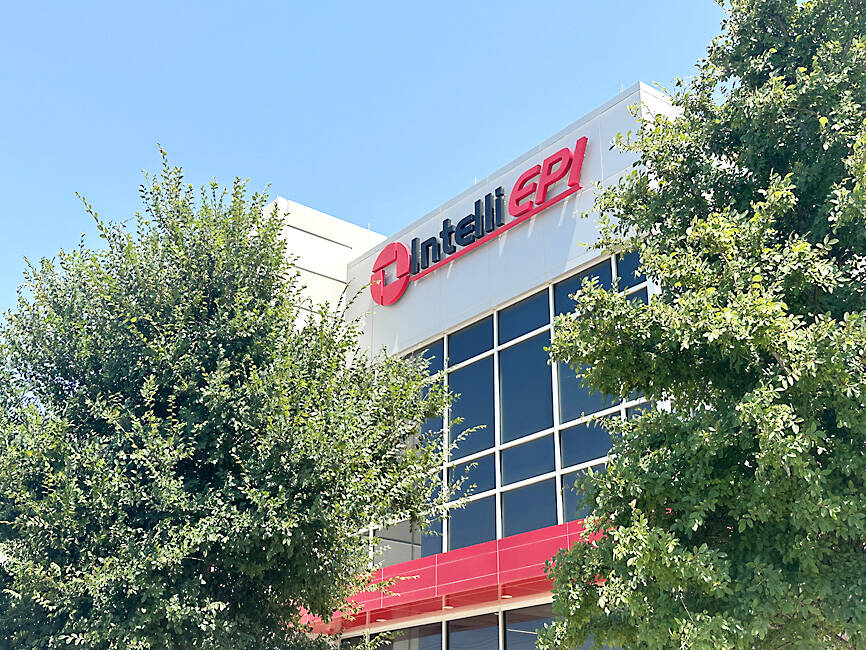IntelliEPI Inc (Cayman) (英特磊), which makes epitaxy-based compound semiconductor wafers, yesterday cut its revenue forecast for this year amid dwindling customer demand.
The company now expects revenue to drop by 5 to 15 percent from last year, reversing its earlier estimate of single-digit percentage growth after last year’s record-high revenue of NT$895.15 million (US$28.15 million). IntelliEPI attributed the downward revision to tepid demand for its indium phosphide (InP) wafers.
“We believe we can generate additional revenue from selling wafer manufacturing equipment and gallium arsenide [GaAs] wafers to offset the loss of indium phosphide wafer orders,” IntelliEPI chairman and CEO Kao Yung-chung (高永中) told an investors’ conference in Taipei yesterday.

Photo: CNA
IntelliEPI has received stable orders for GaAs and gallium antimony (GaSb) wafers used in military devices, Kao said.
The company is also in intensive talks with potential customers to sell wafer manufacturing equipment, he said.
Business “is recovering from a trough,” Kao said. “July revenue should be a baseline for assessing the company’s performance in the third and fourth quarters.”
Revenue last month jumped 11.14 percent year-on-year to NT$67.98 million, but cumulative revenue in the first seven months plummeted 37 percent annually to NT$353.49 million, company data showed.
The company’s InP wafers are used in high-speed fiber networks, while GaAs wafers are mainly used in automotive, military and aerospace devices. The company counts Skyworks Solutions Inc, Samsung Electronics Co and Win Semiconductors Corp (穩懋) among its customers.
IntelliEPI is sticking with its capacity expansion plan in Texas, after posting a quarterly loss last quarter, Kao said in response to an investor’s question.
The company in May made a pre-application for tax incentives and subsidies to US authorities. It plans to raise NT$220 million to finance the construction of a new facility in Texas next year, it said.
IntelliEPI drifted into the red last quarter, posting a loss of NT$20.2 million, compared with a net profit of NT$397 million in the first quarter and NT$60 million in the second quarter last year.
Earnings per share dropped to minus-NT$0.55 last quarter, from NT$0.01 a quarter earlier and NT$1.65 a year ago.
Gross margin plunged to 13.5 percent last quarter from 24.94 in the first quarter and 44.52 percent in the second quarter last year.
The company’s earnings performance last quarter was the weakest in about five years, due to a dip in the InP wafer business, Kao said.
Revenue contribution from InP wafers plunged to 15 percent last quarter, from 44.8 percent in the prior quarter, he said.
With business expected to recover in the third and fourth quarters, the company should be able to eke out a profit for the full year, it said.

BYPASSING CHINA TARIFFS: In the first five months of this year, Foxconn sent US$4.4bn of iPhones to the US from India, compared with US$3.7bn in the whole of last year Nearly all the iPhones exported by Foxconn Technology Group (富士康科技集團) from India went to the US between March and last month, customs data showed, far above last year’s average of 50 percent and a clear sign of Apple Inc’s efforts to bypass high US tariffs imposed on China. The numbers, being reported by Reuters for the first time, show that Apple has realigned its India exports to almost exclusively serve the US market, when previously the devices were more widely distributed to nations including the Netherlands and the Czech Republic. During March to last month, Foxconn, known as Hon Hai Precision Industry

Taiwan Semiconductor Manufacturing Co (TSMC, 台積電) and the University of Tokyo (UTokyo) yesterday announced the launch of the TSMC-UTokyo Lab to promote advanced semiconductor research, education and talent development. The lab is TSMC’s first laboratory collaboration with a university outside Taiwan, the company said in a statement. The lab would leverage “the extensive knowledge, experience, and creativity” of both institutions, the company said. It is located in the Asano Section of UTokyo’s Hongo, Tokyo, campus and would be managed by UTokyo faculty, guided by directors from UTokyo and TSMC, the company said. TSMC began working with UTokyo in 2019, resulting in 21 research projects,

Ashton Hall’s morning routine involves dunking his head in iced Saratoga Spring Water. For the company that sells the bottled water — Hall’s brand of choice for drinking, brushing his teeth and submerging himself — that is fantastic news. “We’re so thankful to this incredible fitness influencer called Ashton Hall,” Saratoga owner Primo Brands Corp’s CEO Robbert Rietbroek said on an earnings call after Hall’s morning routine video went viral. “He really helped put our brand on the map.” Primo Brands, which was not affiliated with Hall when he made his video, is among the increasing number of companies benefiting from influencer

Quanta Computer Inc (廣達) chairman Barry Lam (林百里) yesterday expressed a downbeat view about the prospects of humanoid robots, given high manufacturing costs and a lack of target customers. Despite rising demand and high expectations for humanoid robots, high research-and-development costs and uncertain profitability remain major concerns, Lam told reporters following the company’s annual shareholders’ meeting in Taoyuan. “Since it seems a bit unworthy to use such high-cost robots to do household chores, I believe robots designed for specific purposes would be more valuable and present a better business opportunity,” Lam said Instead of investing in humanoid robots, Quanta has opted to invest